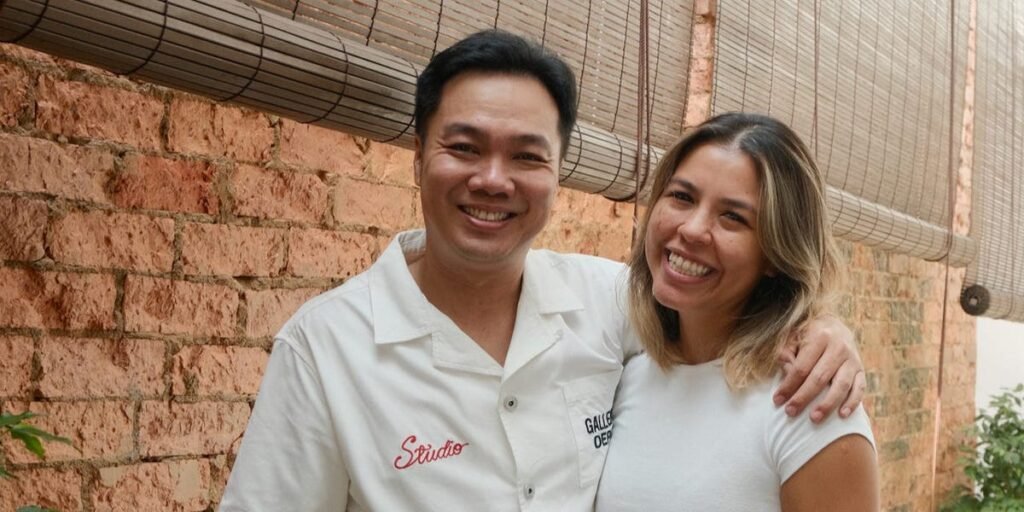- Jeremy Ng and Amanda Misso bought the first floor of a 1950s house in Singapore for about $1.34 million.
- The house had previously been split into seven rooms and was rented out to foreign workers.
- They transformed the unit into a colorful home with lots of natural light and a ride-in motorcycle garage.
After three years in their condo in Geylang, a neighborhood in the eastern region of Singapore, Jeremy Ng and Amanda Misso were on the hunt for a new space.
While they were keen to stay in the same part of the city, they wanted something with a bit more character than the typical, run-of-the-mill apartment.
It took about 20 viewings before they settled on a first-floor residential unit in Joo Chiat, a heritage-rich neighborhood known for its colorful shophouses, cozy cafés, and quaint boutiques. There’s a wide array of food options nearby, from hawker fare to fancy restaurants.
Built in the 1950s, the couple’s 1,900-square-foot unit isn’t quite a shophouse but features a similar layout thanks to its narrow frontage and long floor plan.
“In the 1950s, if you had bought it, you would have bought both floors as a single unit,” Misso, 35, told Business Insider.
But over the years, the house — along with other homes that sit in the same row — had been split into separate upstairs and downstairs units, she said. Now, they have neighbors living above.
“Sometimes, when you go to viewings, every other condo looks the same. The same windows, the same layout,” Misso, who works in finance, said. “This was something that came up that was a bit out of the blue.”
Turning a rundown unit into a home
Singapore — tied with Zurich — is the most expensive city to live in, according to The Economist Intelligence’s Worldwide Cost of Living survey in 2023. The city-state was ranked first place in nine of the past 11 years.
Housing is expensive, largely because the country is small; Singapore’s total land mass measures about 284 square miles. Despite that, it has one of the highest homeownership rates in the world, at nearly 90%, according to the 2024 Home Attainability Index published by the Urban Land Institute Asia Pacific Centre for Housing.
Most people in Singapore live in public housing apartments, known as HDB flats. In recent years, the success of the country’s public housing plan has seen prices of these flats soaring above 1 million Singapore dollars, or about $743,000.
About a fifth of the country’s resident population lives in private housing, which includes condominiums and landed property. The median price of private homes in Singapore was 13.5 times that of the median annual household income of $97,124, per the Home Attainability Index report.
The couple had chanced upon the listing while browsing for homes online, Ng, 44, told BI. The large, rectangular floor plan drew them in.
The unit had been divided into seven different rooms and was being rented out to foreign workers, he said: “It was very rundown — it looked nothing like this.”
It was still tenanted when the couple showed up to tour the unit, Ng, who works in hospitality and entertainment, said.
“When we came in, the agent was trying to show us the bedrooms. He wanted to knock on every bedroom door to open it, and we were like, ‘It’s OK, we don’t even need to see those,'” Misso said. “Because we’re going to gut everything anyway, we just needed to see what had to be done.”
The couple paid almost 1.8 million Singapore dollars, or about $1.34 million, for the property in 2022.
Despite the extent of the work required, the renovations went smoothly. In addition to an interior designer, the couple also had an architect to help them plan the space.
“This would have been our fourth place together, and we kind of already knew the functionalities we wanted in the house, so we built the space around it,” Misso said.
For instance, the couple knew they wanted a large dining and kitchen area where they could have an island counter. While the master bedroom would have an ensuite, they wanted a Jack and Jill bathroom for the other two bedrooms.
They also wanted to preserve some of the house’s original features, like the red brick wall that runs along the hallway and into the courtyard in the back.
That got them thinking about using other pops of colors to brighten their space, Ng said.
They went with olive green cabinets for the kitchen and got a dining table in a matching shade.
To spice things up, they opted for an icy blue water dispenser, which occupies a prime position in the center of their kitchen island. An orange sculptural lamp hangs overhead.
“Our previous place was more mid-century and grunge. Now when our friends come by, they’re always like, ‘Oh, it’s so different!'” Misso said.
It took about eight months for the renovation to be completed.
“This was a bit different from what we were used to when we renovated our condo,” Misso said. “Even after we moved in, we were still mending a few things, which we didn’t realize we needed to until we moved in.”
The couple estimates that they spent about SG$500,000 on the entire renovation.
Simple in the front, party in the back
The living room and the study are located in the front part of the house. Bedrooms are off to the left, and a long corridor covered with a skylight leads to the open kitchen and the courtyard in the back.
And it’s the back of the house that the two of them love.
“I think the front is more functional. It’s really just a living room where we watch TV, but I think the back is where we spend quite a bit of time,” Misso said. “We have dinners here, and when we have friends over, they hang out here. I think everybody just naturally gravitates here.”
Likewise, for Ng, the dining area is his favorite.
“I’m quite pleased with how it turned out because, in our previous place, our dining area was on the balcony to maximize the space,” he said. “So here, it’s so nice to still be able to do things, have a drink, and have everyone gather around here.”
Automated metal shutters flank a glass brick wall that separates the courtyard from the back alley, where the couple sometimes hosts barbecue parties.
Thanks to the shutters, the courtyard also functions as a mini motorcycle garage for the couple’s bikes: A gray Vespa scooter and a black Triumph motorbike.
“Everyone who sees them goes, ‘Amanda, your bike is so cute!’ And I’m like, ‘That’s not mine,'” Misso said. She rides the black Triumph.
The shutters offer a streamlined way for the couple to park their bikes.
“So what happens is one bike comes in and goes out, while the other one comes in and reverses out,” Misso said.
Ng started riding as a teenager, and Misso picked it up some years ago. For them, riding is a more economical and convenient way of getting around the city compared to driving a car.
“It’s so much easier to get to work in the morning and come home in the evening when you’re not stuck in traffic,” Misso said. Now both of their commutes to work are about 15 minutes.
As much as they love their house, there’s just one tiny thing they wish they’d changed about the place.
“It’s just that the bathroom mirror in the master bedroom is a bit too far from you. So when you’re doing your makeup or something, you’ve got to lean in quite a bit because our vanity top is quite big,” Misso said. “It’s such a small thing, but I look at it every day.”
Have you recently bought and renovated your dream home? If you’ve got a story to share, get in touch with me at agoh@businessinsider.com.
Read the full article here

















